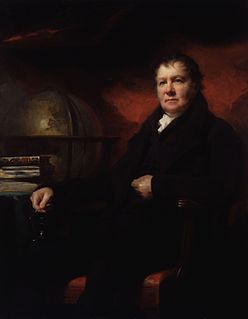A Quote by Max Planck
The worth of a new idea is invariably determined, not by the degree of its intuitiveness-which incidentally, is to a major extent a matter of experience and habit-but by the scope and accuracy of the individual laws to the discovery of which it eventually leads.
Related Quotes
When young Galileo, then a student at Pisa, noticed one day during divine service a chandelier swinging backwards and forwards, and convinced himself, by counting his pulse, that the duration of the oscillations was independent of the arc through which it moved, who could know that this discovery would eventually put it in our power, by means of the pendulum, to attain an accuracy in the measurement of time till then deemed impossible, and would enable the storm-tossed seaman in the most distant oceans to determine in what degree of longitude he was sailing?
The artist has some internal experience that produces a poem, a painting, a piece of music. Spectators submit themselves to the work, which generates an inner experience for them. But historically it's a very new, not to mention vulgar, idea that the spectator's experience should be identical to, or even have anything to do with, the artist's. That idea comes from an over-industrialized society which has learned to distrust magic.
In a government framed for durable liberty, not less regard must be paid to giving the magistrate a proper degree of authority, to make and execute the laws with rigour, than to guarding against encroachments upon the rights of the community. As too much power leads to despotism, too little leads to anarchy, and both eventually to the ruin of the people.
So much of your present experience is based on your previous thought. Thought leads to experience, which leads to thought, which leads to experience. This can produce constant joy when the Sponsoring Thought is joyous. It can, and does, produce continual hell when the Sponsoring Thought is hellatious.
First of all, directing is an idea that you have of a total flow of images that are going on, which are incidentally actors, words, and objects in space. It's an idea you have of yourself, like the idea you have of your own personality which finds its best representation in the world in terms of specific flows of imaginary images. That's what directing is.
Amid all the revolutions of the globe, the economy of Nature has been uniform, ... and her laws are the only things that have resisted the general movement. The rivers and the rocks, the seas and the continents, have been changed in all their parts; but the laws which direct those changes, and the rules to which they are subject, have remained invariably the same.
I would like to suggest to you that the extent to which government in America has departed from the original design of in habiting the destructive actions of man and invoking a common justice; the extent to which government has invaded the productive and creative areas; the extent to which the government in this country has assumed the responsibility for the security, welfare, and prosperity of our people is a measure of the extent to which socialism has developed here in this land of ours.
While, on the one hand, the end of scientific investigation is the discovery of laws, on the other, science will have reached its highest goal when it shall have reduced ultimate laws to one or two, the necessity of which lies outside the sphere of our cognition. These ultimate laws-in the domain of physical science at least-will be the dynamical laws of the relations of matter to number, space, and time. The ultimate data will be number, matter, space, and time themselves. When these relations shall be known, all physical phenomena will be a branch of pure mathematics.
The beginning of civilisation is the discovery of some useful arts, by which men acquire property, comforts, or luxuries. The necessity or desire of preserving them leads to laws and social institutions. The discovery of peculiar arts gives superiority to particular nations ... to subjugate other nations, who learn their arts, and ultimately adopt their manners;- so that in reality the origin as well as the progress and improvement of civil society is founded in mechanical and chemical inventions.
There are five dangerous faults which may affect a general: recklessness, which leads to destruction; cowardice, which leads to capture; a hasty temper, which can be provoked by insults; a delicacy of honour, which is sensitive to shame; over-solicitude for his men, which exposes him to worry and trouble.




































